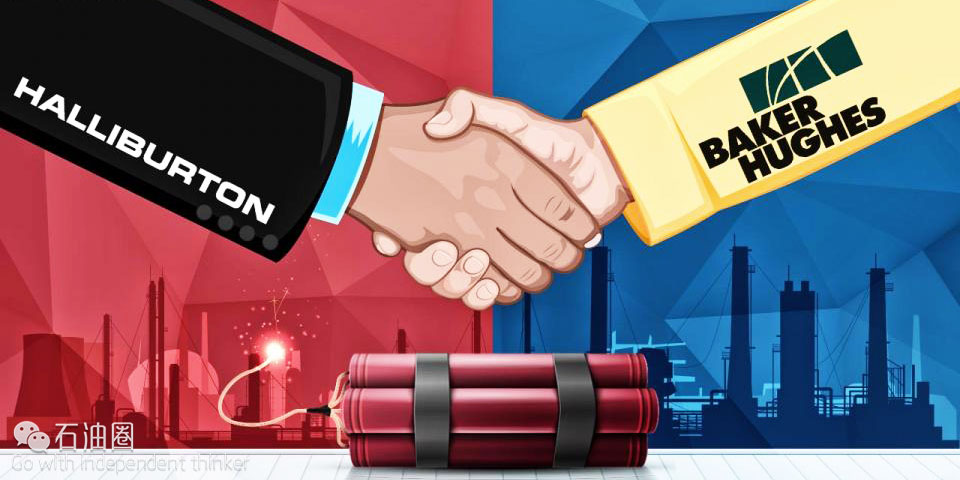With the Halliburton / Baker Hughes merger officially ending over the weekend, the competitive landscape will stay the same in oil services. The merger had its pros and cons. By combining forces, the two companies might have been able to accelerate innovation and integration, creating better products for customers. But taking out such a large competitor would have meant less options for customers (and maybe higher prices). What do you think, is the industry better off with the two companies separate or combined?
Warwick Sanderson
I dont think large companies innovate particularly well and a lot of meaningful innovation comes from smaller more nimble players. I perceive larger companies to be better at acquiring innovation and bringing it to a much wider market. As such I dont think the failure of the merger will have a negative impact on industry innovation.
Separated. Our laws against the possession of monopoly power have merit though been woefully under enforced for the last several decades.
Don Reitsma
“The US Justice Department filed a lawsuit last month to stop the merger, arguing it would leave only two dominant suppliers in 20 business lines in the global well drilling and oil construction services industry, with Schlumberger being the other.” – with the Europeans blocking the merger. How was SLB allowed to buy Smith / M-I and now Cameron to have a market cap of 110B$? they should have never allowed the SLB mergers with that kind of logic.
Danny Felder
No real answer’s out there as to what the market really is or will be right now, just arguments. Houston article this past week end also mentioned SLB, Baker, are thinking of pulling out of North America, until things pick up. 1st quarter losses so far.Baker will come out ahead from not merging. Halliburton am not sure.
Angel Guzman-Garcia
Competition is always beneficial to the customer.
Jeffrey Campbell
The obvious observation is that regulator resistance killed the merger. Less obvious is that HAL/BHI was not able to execute any significant asset sales during the ~18 months the merger attempted to gain approval. One could argue that if such sales had been made quickly to strong hands the various govt regulators might have had a different attitude. In reality, the same crushing market downturn that has sent many weaker companies into bankruptcy made even stronger ones hesitant to commit capital to new ventures, thwarting an important element in the merger gaining traction.
HAL is the obvious loser here coughing up a very large check by Wednesday. It will be interesting to see if there is any meaningful shareholder backlash as a result of this failure. BHI comes out better with a chance to reduce shares outstanding and debt meaningfully. But it gets no free lunch either. In its’ recent earnings call it observed that its’ costs were too high as the result of holding on to certain assets because of the merger (read: more layoffs). Anecdotally, there is evidence of some brain drain as employees left in anticipation of headcount reductions after the merger was completed. Overall, the clear winner here is Schlumberger (SLB), which had no problems with its’ Cameron merger.
[I add in response to some questions on the board that SLB/CAM had no merger issues because their business lines were complimentary, e.g., CAM has significant presence on subsea competing with FMC Technologies (FTI), while SLB had nothing similar in its’ product line.]
Wenceslas Ndinga
As far as I’m concerned I think it is better for them to be separate to afford more jobs opportunities.
Jale Baravilala
This is a good move moving forward, merge the 2 companies is another AOL/Time Warner mega failure
Mike Pollard
I think that answer may vary from area to area. In Norway I think it would be a bad idea as we would be left with only two competitors, and big ones at that. Smaller companies focus more on innovative solutions in my experience, so I am positive to the failure. The one advantage would have been that GE or Weatherford would maybe have purchased the odds and ends and sailed up as a realistic third choice. Maybe
Mohamed Chahtour
I guess, more competitors means more options for products & prices and probably less profit margins for service companies, which means less budget for R&D.
Andrew Ruhl
This is a difficult one to answer. Although I agree with many of the comments about competition, I think a lot of the posters are discounting the cost and cycle time of major R&D work. As the industry pushes the boundary of technical feasibility, the service sector routinely meets the objectives of operators and leaseholders alike with new technology that makes impossibly expensive wells cash flow positive. Those service companies take on the risk of spending lots of front end money on R&D for payout many years later. Small service companies have little cash on hand and cannot support the big R&D divisions that this industry needs to support technical breakthroughs. You’ll find that some of the smaller companies make equipment pursuant to the big companies’ designs once the patent protection expires. So in low cost, high volume market, these smaller players are absolutely essential in providing cheaper products, which they can do because they don’t have to offset the cost of the research. Other small players focus on one specific segment of the industry and while their products can perform better than larger companies’ products as Warwick points out, they cannot take on other segments.
As the industry cycles away from major capital work and towards short cycle work, I think some will be glad for the increased competition that this failed merger provides. However, the goal here was to create a company that could compete directly with SLB. We’ll never know what great new designs will not be developed because of this failed merger.
Emery Ma
As separate companies, this will promote innovation, improve services and product lines. This will benefit the oil companies with healthy competition when comes to awarding contracts. I have worked for both service companies and they both have their strong points. With Halliburton and Baker operating as separate entities, this will only improve operation efficiency and safety and the desire to be better than the other. This is a win-win for all in my book.


 石油圈
石油圈
